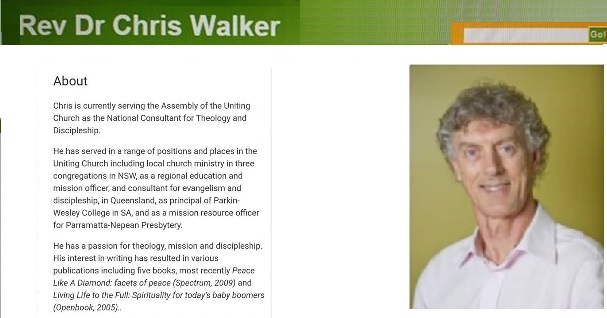with Rev Dr Chris Walker

Living under the reign of God
I read some time ago that the head of a major US company said he had three primary values: God, family and work. He also said that when he gets to the office, he reverses the order. This is telling. He implies that these are three largely distinct areas of his life: God, by which I presume he means personal and church religious involvements, family responsibilities and work commitments. This is in fact an inadequate understanding of the place of Christian faith in one’s life. Let me explain.
When Jesus came proclaiming the kingdom of God, he invited people to respond and in doing so enter the reign of God. Mark’s gospel summarised his message saying, “The time is fulfilled and the kingdom of God has come near; repent and believe in the good news” (Mark 1:15). In Jesus the time was fulfilled. God was acting in a new way. God’s reign had come near. If you were close to Jesus in the first century you were near the force field of God’s influence. This was especially evident in his healings and exorcisms in which suffering and demons were overcome and people restored to fullness of life. They were released from the physical or spiritual forces that dominated their lives.
When Jesus was challenged by some Pharisees that he only cast out demons by the ruler of the demons, Beelzebul, he responded that a house divided will not stand. Then he said, “But if it is by the Spirit of God that I cast our demons, then the kingdom of God has come to you” (Matthew 12:28). The kingdom of God then is where God’s influence is especially evident. The reign of God contrasts with the self-interested ways of the world. In the first century in Israel this was expressed in terms of the world being under the rule of Satan. God’s rule of love, justice, wholeness and peace is breaking into the present evil age through Jesus. He was overcoming Satan, not by force but by the power of love, forgiving love, restorative love.
If we are to enter the reign of God then we have to repent or turn from the way of self-interest, the way of the world, the way of greed and domination. The good news is that if we do so, God readily and gladly forgives and receives us. We enter the rule of God. We are reconciled with God. We can then live out of God’s influence in our lives. The Holy Spirit is given to assist us to do so. In the early church those who responded to the good news were invited to be baptised to signify their change of allegiance – from the world to Jesus. They were promised the Holy Spirit to empower them to live according to God’s will, according to the way of Jesus. In baptism they died to their old life and were raised to new life with Jesus, the risen Lord.
This life of faith is not restricted to personal or church religious involvements. The prophets of ancient Israel were critical of showy religion. Amos declared, speaking for God, “I hate, I despise your festivals, and I take no delight in your solemn assemblies” (Amos 5:21). What God really wants is as follows, “But let justice roll down like waters and righteousness like an everflowing stream” (Amos 5:24). Jesus, too, was critical of hypocritical religion saying, “Beware of practicing your piety before others in order to be seen by them” (Matthew 6:1). Instead, he said, “Strive first for the kingdom of God and his righteousness” (Matthew 6:33). What the prophets and Jesus called for was living out of their relationship with God, living by God’s commands. Jesus summarised these as, “You shall love the Lord your God with all your heart, and with all you soul, and with all your mind. This is the greatest and first commandment. And a second is like it: ‘You shall love your neighbour as yourself.’ On these two commandments hang all the law and the prophets” (Matthew 22:37-40).
If God is to be loved first then this takes precedence even over family. In Matthew’s gospel in speaking about discipleship Jesus says, “Whoever loves father or mother more than me is not worthy of me; and whoever loves son or daughter more than me is not worthy of me; and whoever does not take up the cross and follow me is not worthy of me” (Matthew 10:37-38). In following Jesus, however, true life, meaningful life, is found. Family life in first century Israel, as in most societies, was very important. Jesus relativises family life by placing it under loyalty to God and allegiance to him.
The same applies to work. While work is important, it too needs to come under living according to the reign of God. Jesus told a parable about a person who gave a great dinner. When he invited people, one said he had just bought a piece of land and must go and see it. Another said he had bought five oxen and is going to try them out. Another gave the excuse he has just been married. They all reject the invitation to the banquet. These people put other priorities ahead of the invitation. They failed to respond appropriately putting work and personal interests first.
In the twenty first century living under the reign of God means giving God and Jesus absolute first priority. That relativises all other allegiances and commitments. Political leaders call for giving them our vote and trust. However, we are wise to recognise the limitations of all such leaders and be willing to critique them based on our understanding of what God desires for the nation. Nationalism needs to be kept in check as God’s universal reign is the larger loyalty we have. Work, family and other interests we have, all need to come under living according to the reign of God as depicted by Jesus.

Chris Walker
http://revdrchriswalker.wordpress.com/
Chris is currently serving the Assembly of the Uniting Church as the National Consultant for Theology and Discipleship.
He has served in a range of positions and places in the Uniting Church including local church ministry in three congregations in NSW, as a regional education and mission officer, and consultant for evangelism and discipleship, in Queensland, as principal of Parkin-Wesley College in SA, and as a mission resource officer for Parramatta-Nepean Presbytery.
He has a passion for theology, mission and discipleship. His interest in writing has resulted in various publications including five books, most recently Peace Like A Diamond: facets of peace (Spectrum, 2009) and Living Life to the Full: Spirituality for today’s baby boomers (Openbook, 2005
하나님의 통치 아래 사는 삶
얼마 전, 한 미국 대기업 사장이 자신에게 세 가지 중요한 가치가 있다고 말한 글을 읽었습니다. 바로 하나님, 가족, 그리고 일이었습니다. 그는 사무실에 출근하면 그 순서를 바꾼다고도 했습니다. 이는 시사하는 바가 큽니다. 그는 이 세 가지가 자신의 삶에서 크게 구별되는 세 영역, 즉 하나님(제가 추측하건대 그는 개인적인 삶과 교회의 종교적 참여, 가족에 대한 책임, 그리고 직장에 대한 헌신을 하나님으로 여깁니다.)이라고 말합니다. 사실 이는 기독교 신앙이 우리 삶에서 차지하는 위치를 제대로 이해하지 못한 것입니다. 제가 설명해 드리겠습니다.
예수님께서 하나님 나라를 선포하시며 오셨을 때, 그분은 사람들에게 응답하여 하나님의 통치에 들어가라고 권하셨습니다. 마가복음은 그분의 메시지를 이렇게 요약합니다. “때가 찼고 하나님 나라가 가까이 왔으니 회개하고 복음을 믿으라”(마가복음 1:15). 예수님 안에서 때가 찼습니다. 하나님께서 새로운 방식으로 역사하셨습니다. 하나님의 통치가 가까이 왔습니다. 1세기에 예수님과 가까이 있었다면, 당신은 하나님의 영향력이 미치는 힘의 장(force field)에 가까이 있었던 것입니다. 이는 특히 고통과 악령을 물리치고 사람들이 충만한 삶을 회복하게 하신 예수님의 치유와 엑소시즘에서 분명하게 드러났습니다. 그들은 삶을 지배하던 육체적 또는 영적인 힘에서 해방되었습니다.
예수님께서 몇몇 바리새인들에게 악령의 왕 베엘제불의 힘으로만 악령을 쫓아낸다는 질문을 받으셨을 때, 분열된 집은 서지 못할 것이라고 대답하셨습니다. 그리고 “그러나 내가 하나님의 성령을 힘입어 우리 귀신을 쫓아내는 것이면 하나님의 나라가 이미 너희에게 임하였느니라”(마태복음 12:28)라고 말씀하셨습니다. 그러므로 하나님의 나라는 하나님의 영향력이 특히 두드러지는 곳입니다. 하나님의 통치는 세상의 이기적인 방식과 대조됩니다. 1세기 이스라엘에서 이는 세상이 사탄의 지배 아래 있다는 말로 표현되었습니다. 사랑, 정의, 온전함, 그리고 평화라는 하나님의 통치가 예수님을 통해 이 악한 시대로 들어오고 있습니다. 예수님은 힘이 아니라 사랑, 용서하는 사랑, 회복하는 사랑의 힘으로 사탄을 이기셨습니다.
하나님의 통치에 들어가려면 회개해야 합니다. 즉, 이기심의 길, 세상의 길, 탐욕과 지배의 길에서 돌아서야 합니다. 기쁜 소식은 우리가 그렇게 한다면 하나님께서 기꺼이 우리를 용서하시고 받아주신다는 것입니다. 우리는 하나님의 통치에 들어갑니다. 하나님과 화해하게 됩니다. 그러면 우리는 삶에서 하나님의 영향력을 행사하며 살아갈 수 있습니다. 성령께서 우리를 도우십니다. 초기 교회에서 복음에 응답한 사람들은 세상에서 예수님께로의 충성의 변화를 나타내는 세례를 받도록 초대받았습니다. 그들에게는 하나님의 뜻대로, 예수님의 길을 따라 살 수 있도록 성령이 임할 것이라는 약속이 주어졌습니다. 세례를 통해 그들은 옛 삶을 버리고 부활하신 주님과 함께 새 생명으로 부활했습니다.
이러한 믿음의 삶은 개인적인 신앙이나 교회의 종교적 활동에만 국한되지 않습니다. 고대 이스라엘의 선지자들은 과시적인 종교를 비판했습니다. 아모스는 하나님을 대신하여 “내가 너희 절기들을 미워하고 멸시하며 너희 성회를 기뻐하지 아니하노라”(아모스 5:21)라고 선포했습니다. 하나님께서 진정으로 원하시는 것은 “오직 정의를 물같이, 공의를 마르지 않는 강같이 흐르게 하라”(아모스 5:24)입니다. 예수님께서도 위선적인 종교를 비판하시며 “사람에게 보이려고 그들 앞에서 너희 의를 행하지 않도록 조심하라”(마태복음 6:1)라고 말씀하셨습니다. 오히려 예수님은 “너희는 먼저 그의 나라와 그의 의를 구하라”(마태복음 6:33)라고 말씀하셨습니다. 선지자들과 예수님께서 요구하신 것은 하나님과의 관계 안에서, 하나님의 계명대로 사는 것이었습니다. 예수님은 이것들을 이렇게 요약하셨습니다. “네 마음을 다하고 목숨을 다하고 뜻을 다하여 주 너의 하나님을 사랑하라. 이것이 크고 첫째 되는 계명이요, 둘째도 그와 같으니 네 이웃을 네 자신과 같이 사랑하라. 이 두 계명이 온 율법과 선지자의 강령이니라”(마태복음 22:37-40).
하나님을 먼저 사랑해야 한다면, 이는 가족보다 우선합니다. 마태복음에서 예수님은 제자도에 대해 말씀하시면서 이렇게 말씀하셨습니다. “아버지나 어머니를 나보다 더 사랑하는 사람은 내게 합당하지 아니하고 아들이나 딸을 나보다 더 사랑하는 사람도 내게 합당하지 아니하고 십자가를 지고 나를 따르지 않는 사람도 내게 합당하지 아니하니라”(마태복음 10:37-38). 그러나 예수님을 따를 때 참된 삶, 의미 있는 삶을 발견하게 됩니다. 대부분의 사회와 마찬가지로 1세기 이스라엘에서도 가족생활은 매우 중요했습니다. 예수님은 가족생활을 하나님께 대한 충성과 충성 아래 두심으로써 상대화하셨습니다.
일에도 마찬가지입니다. 일은 중요하지만, 하나님의 통치에 따라 사는 삶 아래 있어야 합니다. 예수님께서는 성대한 만찬을 베푼 사람에 대한 비유를 말씀하셨습니다. 예수님께서 사람들을 초대했을 때, 어떤 사람은 땅을 샀으니 가서 봐야 한다고 말했습니다. 어떤 사람은 소 다섯 마리를 샀으니 시험해 보겠다고 했습니다. 또 어떤 사람은 결혼했다는 핑계를 댔습니다. 그들은 모두 만찬 초대를 거절했습니다. 이 사람들은 초대보다 다른 우선순위를 더 중요하게 여겼습니다. 일과 개인적인 이익을 우선시하며 적절하게 반응하지 못했습니다.
21세기에 하나님의 통치 아래 산다는 것은 하나님과 예수님을 절대적으로 최우선으로 여기는 것을 의미합니다. 이는 다른 모든 충성과 헌신을 상대화하는 것입니다. 정치 지도자들은 그들에게 투표권과 신뢰를 주라고 요구합니다. 그러나 우리는 그러한 모든 지도자들의 한계를 인식하고, 하나님께서 이 나라를 위해 바라시는 것이 무엇인지에 대한 우리의 이해에 따라 그들을 비판할 의지를 갖는 것이 현명합니다. 하나님의 보편적 통치는 우리의 충성심이 더 크기 때문에 민족주의는 억제되어야 합니다. 우리가 가지고 있는 일, 가족, 그리고 다른 관심사들은 모두 예수께서 묘사하신 하나님의 통치에 따라 사는 삶의 틀에 들어가야 합니다.
번역 = 크리스천라이프 편집부

